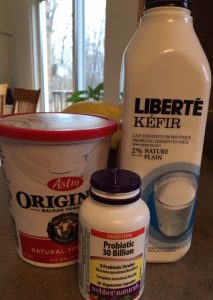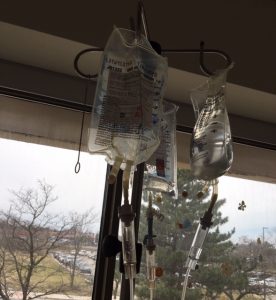It’s a real thing.
But you wouldn’t know until you experience it, as it suffers from “We don’t talk about that kind of stuff” syndrome. When you hear about chemo side effects, the biggies such as nausea and hair loss get all the glory and your poor bowels are shunted to the bottom of the list.
After over 20 years working in long term care, I can tell you that the sun rises and sets on whether you have had a good poop today. Staying “regular” – such a euphemism – is a really important health factor. “Have you gone today?” – another euphemism – is asked of every resident daily, and they are not allowed to go past 3 days without some kind of intervention.
A wee lesson in anatomy and physiology first… The entire digestive tract is one long tube, stretching from mouth to anus. When we eat, we take food into the centre, or lumen, of that tube, but not actually into our body. It’s like the water that flows through a hose. It’s “inside” the hose, but not part of the hose. We have an amazing and elegant system of digestion that allows us to extract basic nutrients from the contents of our digestive tract and then we transport them across (or through) the walls of the intestine to enter the blood stream and be taken to the liver for redirection to wherever each nutrient needs to go. Most of that process takes place in the small intestine, which is about 6 m (20 feet) long if stretched out. After most of the important nutrients (protein, fats, carbohydrates, mineral and vitamins, plant sterols and anti-oxidant) are absorbed into the body, what remains of our food passes into the large intestine, another 1.5 m (5 feet) of rather amazing technology. The large intestine is home to our microbiome – the trillions of bacteria and other organisms that call us home. It was originally thought that the only thing that really happened in the large intestine was fluid balance – that is, extra fluid would be gradually removed from the bowel contents until it had solidified into what we recognize as a poop (officially called feces or stool). But we now are coming to understand that there are countless functions that the microbiome performs for us. We feed it by consuming food components that we can’t digest ourselves. We refer to it mostly as “fibre”. The bacteria break down this indigestible carbohydrate and produce short chain fatty acids, which provide them with nourishment. At the bottom of the large intestine is a slight pouch, called the rectum. As it fills up with stool over the course of the day, it will eventually put pressure on the walls of the rectum, sending a signal to the brain that it needs to be emptied. And off we go to find a bathroom. At least that’s how it’s supposed to go…
If the system is not working correctly, the bowel might cramp and clench and move the still liquid contents through too fast and it comes out as diarrhea. If the system is too sluggish or the person is not drinking enough, the bowel contents might have too much water removed, leaving the feces too hard, and we call that constipation.
Constipation is not about timing. It’s about texture. Some people only defecate every couple of days, but this is fine if the stool that comes out is soft and easy to pass without straining and pain. Some people poop a couple of times a day – also okay if the texture is formed and easy to pass. But if stool becomes hard in consistency, and requires straining or pain to get out, that’s constipation.
There are many drugs that can cause constipation. Some work by making the bowel sluggish so that the stool material spends too long in transit, allowing for too much water to be withdrawn. Others are just plain constipating. Most narcotic pain meds are very prone to slowing the bowels, often requiring the use of laxative medications to handle this side effect. Iron supplements are also very constipating.
Well, it turns out that chemo drugs are very constipating as well. So is Zofran, the medication that I take to prevent nausea. It’s a very effective medication – I haven’t experienced any real nausea yet – but oh, boy! The combination does a number on my bowels! After each cycle so far, I have had severe constipation, the worst I have ever experienced in my life. And I’ve had a relatively constipation-free life so far, no matter what dietary patterns I have been following. My bowels have been very happy with a low carb high vegetable diet in the last couple of years, with smaller but regular stools and way less abdominal gas since the removal of grains from my diet. But this! This was orders of magnitude worse. And, stupid me – I was onto my third go of really painful hard stools before I finally wised up and realized that this was definitely a drug effect and needed to be treated with something more than what I had been doing. My “trust your body – it will be fine” approach wasn’t working.
Each cycle, I have had problems in the first 3-4 days after chemo administration. But on the second cycle, I also got into major difficulties in the second week. That was definitely a chemo drug effect, as I was taking absolutely nothing else in terms of medications and there were no changes to my diet or fluid intake.
My plan of attack for preventing these problems again is two pronged. I have stocked my house with a PEG style powder lax/stool softener (Restorlax) and a more direct laxative (Ducolax, only for the direst situation…). I plan to take the PEG on the night after chemo, as it will not impact on my fasting state. But more importantly, I’m using low carb dietary fibre sources to bulk up my bowel contents dramatically and keep my stools soft and passing easily. The main contributors are flax meal and psyllium incorporated into a bread recipe and I am having several slices every morning. It has made an impressive impact on my regularity so far. Hopefully, I can manage this annoying side effect with food, remain capefearcardiology medication free and stay in ketosis.
And keep the train leaving the station on time… (another euphemism…)



